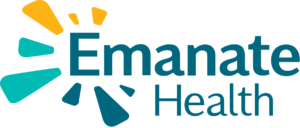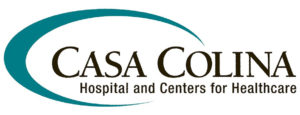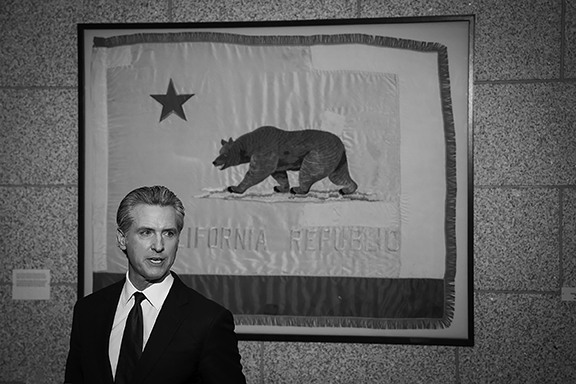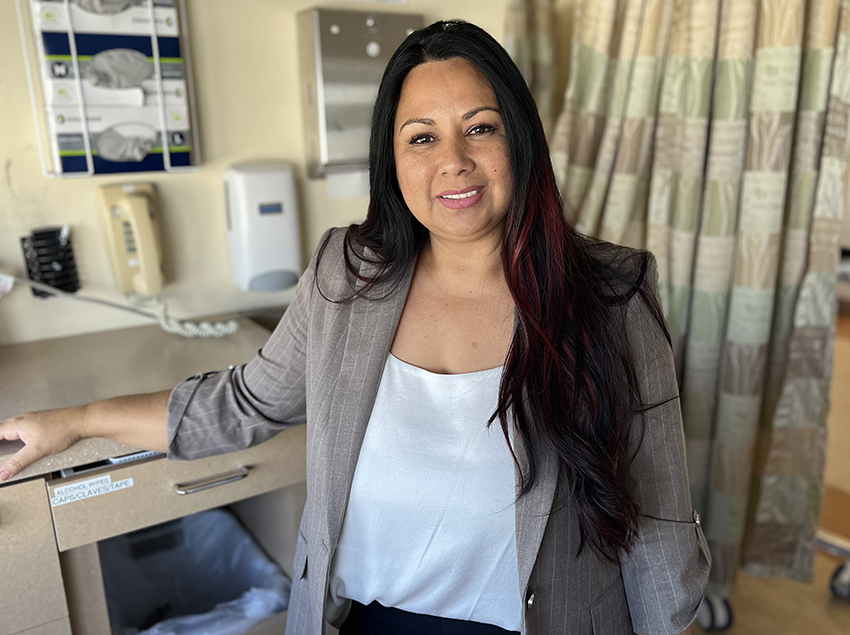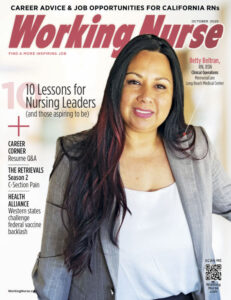Feature
Making COVID-19 Count
How nurses can use this crisis as a catalyst for change

Editors’ Note: This article is a revised and expanded version of the author’s much-discussed LinkedIn essay, originally posted on May 22, 2020.
COVID-19 has made nursing front page news. This public recognition has given nurses an unprecedented moment of well-deserved appreciation. We need to harness this momentum to make real and lasting changes. If we act now, we can elevate the role nurses play in all aspects of healthcare. To prepare for the next crisis — and for the good of the healthcare system — we nurses need to become more effective advocates, from the bedside to the boardroom.
“What Would Florence Do?”
Before anyone saw COVID-19 coming, the World Health Organization (WHO) designated 2020 as the International Year of the Nurse and Midwife, in honor of the 200th anniversary of Florence Nightingale’s birth and in recognition of “nurses’ vital role in transforming healthcare around the world.
As we commemorated Florence’s birthday on May 12th, I asked myself, “What would Florence do if she were here today, responding to COVID-19?” The heroic sacrifices nurses are making in our war against the coronavirus remind me of the inspiring, selfless service that Florence Nightingale and her team of nurses provided during the Crimean War. In October 1854,
Florence led 38 volunteer nurses to care for British soldiers in a military hospital in Turkey. When the nurses first arrived, They were appalled at the poor care the soldiers were receiving. Their clothing and beds were filthy, medicine and other essentials were in short supply, the food was terrible, and the sewage system was overflowing. The nurses took the initiative in transforming their patients’ circumstances.They brought in clean towels, fresh changes of clothing and soap. They scrubbed the kitchen and prepared healthy food. They even arranged for the sewage system to be drained.
Florence Nightingale was an effective advocate for her patients and for the nurses who cared for them. She was both compassionate and willing to wade into conflict when necessary. She fought incompetence and indifference, applied the new field of statistics to military and civilian hospitals, and made public health a national priority in Great Britain. Like Florence, we have an opportunity to turn the present crisis into a movement and use our voices to make a lasting difference.
A Call to Action
We must not let institutions or elected officials forget the costly lessons that COVID-19 has so forcibly taught us. Faulty assumptions, systems and processes failed us, and our patients and nurses caught the brunt of it. Default thinking proved inadequate and compromised our ability to care for patients (and ourselves and our families) during this pandemic. Nurses need to speak up and speak out against the status quo. The moment is now, and the responsibility is ours.
Here’s my advice on what it takes to do that, illustrated with some examples from my own life.
- Be courageous. Nurses have a 150-year history of being submissive and subservient to others. It’s time for us to stand up for ourselves and our patients. We must always be professional and well-prepared, but we must also learn to use our voices and lead from wherever we are. To find your courage, be open to input from trusted friends and colleagues. Others can often see things in us that we don’t see ourselves.Earlier in my career, a friend invited me to run for office in a national nursing organization (the National Association of Neonatal Nurses). I didn’t sleep for two weeks, worrying about whether I was up to the task. It was the encouragement of my family and my nursing team that finally convinced me to do it. From that decision, I learned the value of listening to the 7,500 members speaking their truth about the challenges of being a bedside nurse. I remember being at the organization’s annual conference and meeting hundreds of the neonatal nurses who treat our smallest and most vulnerable patients.Reflecting on the honor, privilege and responsibility of representing those nurses, I was deeply grateful for the people who had encouraged me to run. Through my presidency and the association’s campaign for safer staffing in labor & delivery units, I learned how to lead through influence and collaboration, which are invaluable skills for any nurse leader. None of that would have happened if I hadn’t found the courage to step up.
- Complaining and commiserating amongst ourselves gets us nowhere. To move leaders to action, you need irrefutable facts — and you also need to combine them with real stories about real people. Sharing stories helps to contextualize what the data means and underscores the human costs of failing to act.Years ago, hospitals considered parents to be visitors, forcing them to leave their children’s bedside during rounds and at night. One night, a child in a hospital where I was working died alone, unnecessarily, as a direct result of these archaic rules. I knew this was wrong, so I used my voice to ensure that it never happened again. I partnered with several like-minded nurses, and we invited parents to join the cause. We formed a family advisory committee that changed this policy forever, reminding the administration that no child should ever be alone, much less die alone.
- Invite yourself. Stop waiting for an invitation to get involved. Take the initiative to show up at relevant meetings and reach out to influential leaders. Social media makes it easy to connect; if someone doesn’t accept your invitation, just move on. For years, I’d admired the work of Barry Posner, Ph.D., coauthor of The Leadership Challenge, from afar. He graciously accepted my invitation to connect on LinkedIn and subsequently became my mentor and friend.Now, several years after that LinkedIn message, Barry has invited me to become a certified master of The Leadership Challenge, joining an elite group of fewer than 100 people worldwide. It’s a testament to the potential rewards of taking a chance, ignoring your fear of rejection and inviting yourself.
- Never stop learning. The best nurses are always learning. Of course, we have a legal responsibility to be lifelong learners to maintain our licenses, but with lives hanging in the balance, no one should have to order us to continue educating ourselves. Don’t let budget cuts limit your education and training opportunities. Invest in yourself. Resist the temptation to trade short-term savings for long-term losses. As a single mother, getting my master’s degree was an undertaking in itself. After my third class, my hospital discontinued tuition reimbursement for advanced degrees. So, I paid for it myself with my Visa card and then worked and worked until I could pay it off because I knew it was the right thing to do for my career.
- Nurse leaders, don’t wall yourselves off. I’ve found that nurse leaders can end up spending most of our time in meetings away from our patients and staff. To keep this from happening, when I was a chief nurse I created a program called “Frontline Fridays.” Every Friday, my nurse leadership team and I put on our scrubs and worked alongside the nursing staff. This program came about after hearing our frontline staff voice concerns about not seeing their leaders, and those leaders not knowing what was truly happening at the bedside.Soon after launching Frontline Fridays, we saw improvements in patient satisfaction, leader engagement and patient outcomes. The most powerful moment for me came from an elderly female patient that I was helping turn to prevent pressure ulcers. She told me that she had never met a chief nurse before and that the staff nurses were amazing, especially those on the night shift. She explained that they kept her from being lonely and afraid. Without the Frontline Fridays program, I would never have had the chance to look in her eyes and hear her beautiful comments, which fueled me that day, that week and even today. Moments like that drive me to keep on leading and encouraging nurse leaders to stay visible and at the bedside.
- Join the Nurse Leader Alliance. Early in my career as a neonatal intensive care nurse, I quickly learned how important it was for me to be a voice for my patients, who were too small to speak, and for their parents, who often were too scared to speak. This was the beginning of my unwavering commitment to using my role as a nurse to make a difference in the lives of the patients I touch. Now, as seasoned nurse leader living through COVID-19, a gnawing grew inside of me.As I often do, I took this gnawing feeling and turned it into writing. My original LinkedIn post, “Making COVID-19 Count” (www.linkedin.com/in/armstronglori), resulted in an overwhelming amount of feedback from the nursing leadership community. So many shared my desire to turn this moment in nursing history into a movement.With that, the concept of the Nurse Leader Alliance was born. My colleagues and I are joining forces to create a grassroots nurse leadership organization to elevate the role nurses play in delivering quality patient care and improving outcomes — the ultimate goals of every hospital.
Through the Nurse Leader Alliance, we want to give a voice to every nurse, nurse manager, nurse director and nurse leader focused on transforming care of patients and the image of nursing. You can join us in creating a community at all levels of nursing and across all practice areas. Yes, we are heroes right now as a result of COVID-19, but we shouldn’t have to resort to heroics to do our jobs. We are going to make this moment count by using our skills to:



